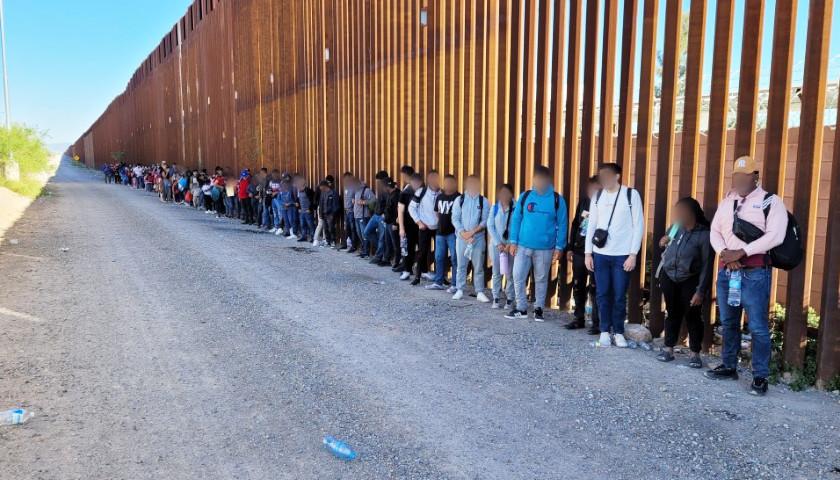Pennsylvania’s State Senate Republican policy chair on Friday said he’s sponsoring legislation gradually raising the commonwealth’s minimum hourly wage to $15 and thence indexing it to inflation.
State Senator Dan Laughlin (R-Erie), one of his chamber’s most moderate Republicans representing one of its most electorally competitive districts, said that he carefully mulled the issue before announcing his measure. The Keystone State’s pay floor rose to $7.25 per hour in 2008, matching the federal minimum wage, and the senator insisted now is the time for an increase, observing that 30 states now set their floors higher.
“I have heard from my constituents and have listened to both sides of the political aisle…,” Laughlin (pictured above) said in a statement. “It is time we address the issue and I believe this bill is the most responsible way to approach it.”
A co-sponsorship memorandum indicates the bill would push the hourly minimum to $11 next January, $13 in 2025 and $15 in 2026. The legislation would tie increases thereafter to inflation, a policy in place in 15 other states and recommended by left-leaning research institutions, including the Economic Policy Institute. The minimum wage for tipped employees, now $2.83 per hour, would be set at 40 percent of the state wage floor.
Progressives have also clamored for raising the national and state minimum wages to $15. Laughlin’s support for a hike could help Democrats who control the House of Representatives, as well as Governor Josh Shapiro, to effect a change they have made a priority during the new legislative session.
“Too many people have worked too hard for too long to not be able to pay their bills,” State Representative Patty Kim (D-Harrisburg) said at a House Majority Policy Committee hearing on the issue last month. “We want to tag a cost-of-living adjustment on this, so we never have to wait years and years – or wait for a once-in-a-century pandemic – for this issue to have a bright light shined on it.”
According to a Pennsylvania Minimum Wage Advisory Board report, 63,800 individuals, or two percent of the state’s workforce, earned $7.25 per hour or less in 2021. Democrats continue to cite that figure, neglecting to mention that wages have risen significantly during the last two years and that many of those earning the lowest wages are teenagers working their first jobs.
Elizabeth Stelle, director of policy analysis at the Harrisburg-based Commonwealth Foundation, said wage requirements are an inadvisable means to boost workers’ earnings. She noted that individuals earning the precise minimum wage (not tipped workers earning less) make up about 0.5 percent of the state’s workforce.
“Every year we see fewer and fewer Pennsylvanians making that minimum wage,” she told The Pennsylvania Daily Star. “It kind of raises the question, Who are we actually helping here when there’re so few of us making this wage? And we would argue that it’s really important that you do have a way for those with no work experience or other sorts of challenges to enter the marketplace. And if you inflate that entry wage, then you’re going to prohibit those opportunities.”
In the relatively few instances when a minimum-wage hike would have an effect, Stelle explained, it could harm those the policy is designed to help. Employers could, for instance, cut back on healthcare and other benefits or workable hours.
When Amazon set the minimum hourly pay to $15 in 2018, for instance, the company received public plaudits, but it meanwhile suspended employees’ monthly bonuses and stock options.
“There are other ways that employers might try to compensate for that additional wage that they have to pay,” she said. “And sometimes those fringe or flex benefits can actually be more important to workers than the pay itself. There’re a lot of unintended consequences… from an economic perspective that one needs to consider.”
Another of those effects, according to studies from institutions like the Federal Reserve Bank of Chicago and the German Institute for the Study of Labor, is worsening inflation since businesses can pass the increased hiring costs onto consumers.
“If your pizza shop has to start paying more to each of their workers and they might raise their prices,” Stelle said, “that can kind of create a domino effect across the economy that, in the end, really doesn’t help anyone get ahead.”
While a wage-floor rise may benefit very few struggling workers, labor unions exert considerable clout in favor of the policy. For example, the Service Employees International Union often spends tens of millions of dollars within a year advocating for such a change. Union members would have much to gain from it insofar as their contracts often include provisions tying their significantly higher pay levels to the minimum wage.
– – –
Bradley Vasoli is managing editor of The Pennsylvania Daily Star. Follow Brad on Twitter at @BVasoli. Email tips to [email protected].
Photo “Senator Dan Laughlin” by Senator Dan Laughlin. Background Photo “Pennsylvania Capitol” by Niagara. CC BY-SA 3.0.




